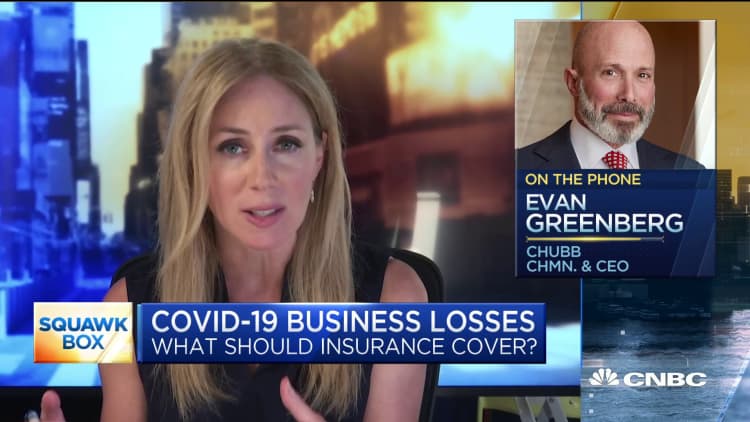
Chubb Chairman and CEO Evan Greenberg told CNBC on Thursday the insurance industry is confronting an event like no other when it comes to the Covid-19 pandemic.
"It has no time limit, and it has no geographic bounds," Greenberg said on "Squawk Box." "For business interruption, the loss is essentially infinite, and insurers have a finite balance sheet."
"So, the insurance industry's ability to take pandemic risk is very limited," he added.
The Covid-19 crisis has highlighted how property and casualty insurance companies typically do not cover pandemics. However, as the crisis has forced the closure of a record number of businesses, with losses estimated to be $1 trillion, according to the American Property Casualty Insurance Association, the industry has initiated a conversation with the government about a subsidized response to business interruption insurance.
Greenberg said that in a situation like a pandemic, the cooperation between public and private entities is critical. Chubb has released a two-prong proposal in that spirit: one program for small business and one for medium and large business.
Small businesses would receive a predetermined payout based on payroll if a pandemic lockdown were to be declared, while medium and large businesses would receive an indemnity-based payout. In each case, the insurance industry would assume up to $15 billion, which grows over the next 20 years. In a unique move, the government would assume the rest of the risk in Chubb's proposal.
"The government takes the tail risk, and limits the amount of liability insurance the company would take," said Greenberg. "Insurers could play a broader role in assuming coverage in the future, should we have future pandemics."
Greenberg highlighted the unprecedented need this pandemic has revealed for payouts.
"Fundamentally you're equating, just for business interruption, losses very close to those of Hurricane Katrina," Greenberg said, referring to the deadly 2005 storm that caused over $100 billion in damage.
And the expenses don't stop at business interruption.
"We still have to pay workers compensation, liability protections, and all kinds of other insurance exposures that will be incurred," Greenberg added.
In the company's second-quarter release this week, where Chubb exceeded Wall Street expectations with a loss of 56 cents per share, the company noted that a significant amount of loss came from coronavirus exposure, even before business interruptions are taken into account. The losses were due to expected decreases in payroll — the fewer employees a business keeps on payroll, the less exposure the company has to damages. That leads to less coverage being needed, leading to reduced premiums.
Greenberg emphasized the scale of the payouts due to this conflation of events.
"Putting business interruptions aside, the industry is likely to pay out, in the pandemic, somewhere in the range of $100 billion globally," he said.
Chubb has set up the public-private partnership in order to get ahead of the next pandemic. But Greenberg also noted that given the unique response officials took in order to mitigate the spread of Covid-19, it's possible that a response of this magnitude may not be necessary in the future, and that the percentage of risk insurers assume could change.
"In a future pandemic, we're going to have to have a better health-care response than the notion of having to shut down the economy to manage a pandemic," Greenberg said. "If you assume we would have a better health-care response and it would be more limited, the kind of percentage you're talking about would go up significantly."
Greenberg noted that while insurers are engaging with the government today, things may look different next time such a policy is needed.
"This is not something that's going to ripen in the short term, and it shouldn't," he said. "What we're trying to do as a company is help the debate, help spark ideas."
"I'm sure what will come out in the end will look different," he added.
Correction: This story was revised to correct that Chubb's payroll plan proposes that the insurance industry assume up to $15 billion.


